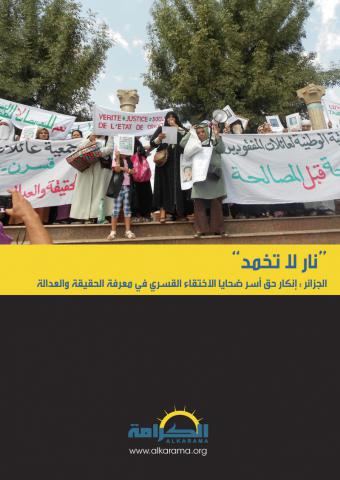
Geneva, 30 August 2016
On the occasion of the International Day of the Victims of Enforced Disappearances, Alkarama denounces, in its latest public report, the denial of the right to truth and justice for the families of disappeared people and calls upon the Algerian authorities to engage in a genuine process of national reconciliation. Indeed, 20 years after the disappearance of thousands of victims arrested during the civil war and 10 years after the adoption of the “Charter for Peace and National Reconciliation”, their families still know nothing about their fate, and the authorities persist in denying responsibility for these crimes.
In the aftermath of the military coup of January 1992, which followed the first pluralist elections in the country, a huge crackdown was implemented to put an end to the protests of activists of the Islamic Salvation Front (FIS) which won the elections, and to “eradicate” the armed insurrection. This repression took, amongst others, the form of a massive use of enforced disappearances, which led to 7000 victims recognised by the authorities and 20 000 according to NGOs. Whether arrested or abducted by the army, the intelligence services (DRS), the police, or paramilitary militias, these victims have never reappeared.
The impact on the families of victims of enforced disappearances remain present and profound. Long stigmatised as “terrorists' families” and constantly subjected to threats and reprisals, they are still facing the constant denial of the Algerian State and the negation of their right to know the truth. In 2006, such denial was enshrined in a “Charter for Peace and National Reconciliation”, which not only makes inadmissible any legitimate claim of the families to their rights, but also subjects them to imprisonment if they denounce the perpetrators of violations committed during the civil war.
“Enforced disappearance is not only a violation of human rights or a 'crime against humanity’ under international criminal law, it is also and above all, a technique of repression used by authoritarian regimes to control society through terror”, says Rachid Mesli, Legal Director of the Alkarama Foundation. “It is undoubtedly, for the Algeria of the 90’s, a deliberate strategy of terror implemented by the military and civil 'decision-makers' of the time to suppress a population that ‘had badly voted’ “.
To this day, the authorities continue to refuse to shed light on the fate of the disappeared in spite of the decisions and recommendations of the UN, urging them to tell the truth to the families, to investigate this mass crime and to prosecute its perpetrators.
Such an approach in the treatment of the disappearances perpetrated during the civil war, does not allow for the implementation of a genuine process of national reconciliation leading to the establishment of sustainable appeasement of the Algerian society and to ensure that such crimes do not recur ever again in the future. The Algerian government must now determine the perpetrators of serious crimes liable and grant the legitimate expectations of the families of the victims: it is not only a legal obligation, but also a political, ethical and social duty towards the Algerian society as a whole.
*The report is available in French and in Arabic.
- -END- -
For more information or an interview, please contact:
- Alkarama’s Media Team: media@alkarama.org (+41 22 734 10 08)
Based in Geneva, the Alkarama Foundation is a non-governmental human rights organization created in 2004 to support all individuals in the Arab world, subjected to risk of extrajudicial execution, enforced disappearance, torture and arbitrary detention. Acting as a bridge between the victims in the Arab world and the Human Rights mechanisms of the United Nations, Alkarama works for an Arab world where all people live free, in dignity, and protected by Rule of Law. In Arabic, Alkarama means 'dignity'.
